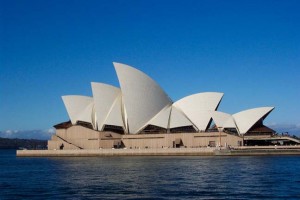by Jeff Fleischer
(Abroadview, Fall 2004)There’s nothing like working as a reporter to get to know a place. I had never studied abroad during my undergraduate years, so I was keen to take a three-month reporting residency at The Sydney Morning Herald.
Australia appealed to me, because I figured it would be enough like the U.S. that I could report and write effectively but different enough to be new and interesting. This proved entirely true, as Sydney has most of the advantages of a major American city (only cleaner, safer and with different sports).
But Australian news rarely makes it to the other side of the world, especially since the 2000 Olympics wrapped up. While I’d read my fair share of Aussie history and kept up with major events over the Internet before arriving ”Down Under,” the differences in Australian and American day-to-day news provided both a great work experience and an education about this modern nation.
Writing for an Australian audience meant a few small adjustments. For starters, I quickly learned Australian slang (I was admittedly a bit confused the first time someone asked, “How are you going?” or suggested meeting at a “hotel.”), mastered Aussie spelling (colour, aeroplane, tyre, organise), and removed “Americanisms” from my writing.
I also learned that Australians like their stories short and lean. Most articles in the Morning Herald run less than 400 words (less than half the length of the article you’re reading now, and shorter than articles in most U.S. papers), without nearly as many quotes from sources as American media tend to publish. This was a challenge at times—for example, I had to combine coverage of two entirely different protests into one short piece—but I became “right good” at trimming my own copy. And the tone of the writing was slightly less formal—headlines were often more humorous than informative, some politicians were identified by first names, and op/ed columns regularly contained words that would drive the American FCC mad.
The biggest difference I found reporting in Sydney was the focus on issue-driven news. Part of that stems from the culture. Despite having a larger population than Chicago, Sydney had only 91 murders last year, so the front page is more likely to feature coverage of a new health initiative or the prime minister’s most recent address. The international news section focused on countries that rarely see the light of U.S. media coverage, with nations like Zimbabwe, Thailand, Burma and Singapore featured regularly. There’s also more focus on topics like the environment, history and scientific research than I’d ever seen in my hometown press.
I was thoroughly impressed by our readers’ knowledge of the news. Coming from the States, I was used to “letters to the editor” merely degenerating into name-calling or oversimplifying issues. The Morning Herald’s letters page had its share of this, but it also regularly included well-argued, well-researched responses that proposed alternate solutions.
Even during small talk with cabdrivers or in pubs, I found people generally informed about the news of the day, both in Australia and abroad (and believe me, I fielded plenty of questions about Arnold Schwarzenegger).
Working at the Morning Herald also gave me access to hundreds of reporters who were experts on their individual beats and were happy to answer any questions I had about the superannuation pension, film commission subsidies or the political process. I spent numerous hours reading through the paper’s archives and perusing books in its research library to learn more about the history that had spawned current events.
Had I worked in Sydney for a wire service or just as a freelance writer, I would have covered only stories aimed at readers outside Australia. Instead, I learned what Sydneysiders care about. I wrote about topics as serious as grant programs for Aboriginal students and as quirky as a plan to create new standards for nationwide clothing sizes by measuring the population.
Even the stories I didn’t cover taught me a great deal about Australia, as I saw how the paper reported on major events. I arrived at a busy time, with the war in Iraq spurring record protests, the Labour Party radically shaking up its leadership, talks intensifying for a tariff-free trade deal with the U.S., and the Australian national team reaching the finals of the Rugby World Cup on its home turf.
My time in Sydney cemented my goal of reporting on policy, politics and international news, while letting me see media practices from a different perspective. In journalism, there is no skill more important than versatility, and working overseas let me prove myself in a foreign venue.
Six months after getting back to the States, I still do my best to keep up with Aussie news, as it has a relevance for me that I wouldn’t have acquired had I spent my time there in a classroom or traveling around. I’m eager to see how the upcoming election plays out and what happens with the proposed construction along Sydney Harbour. And I’m constantly plotting ways to get back soon.
Now, if I could just find an American restaurant that serves Vegemite.
Tags: abroadview, australia, business, jeff fleischer, sydney, working abroad
